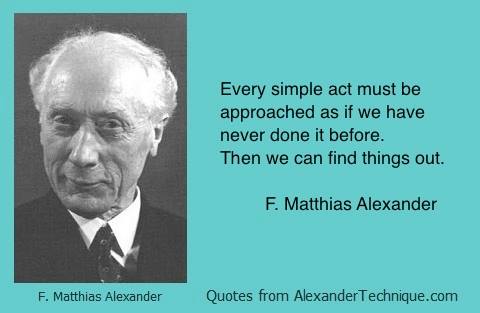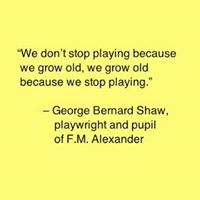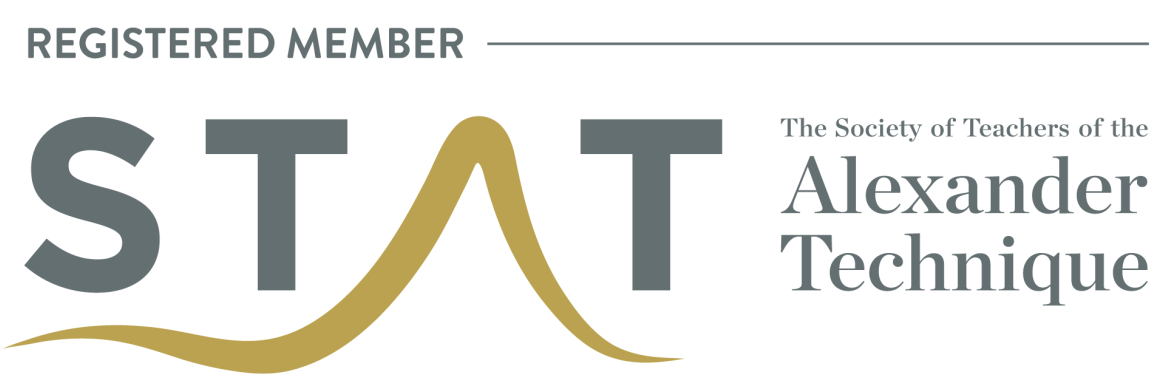My Blog
Here are some articles that myself or my clients have written which illustrate the profound effect that learning the Alexander Technique can have on the way we live our lives.
What does good posture actually mean and what effect does poor posture have?

I recently was visiting the grounds of Castle Howard in Yorkshire and it struck me that all of the statues displayed good posture and if we created statues today would they display the same obvious traits of good posture? I think not! Well why is this and what is going on?
Well during our lives we develop all kinds of traits, mannerisms and signs of poor posture. Although as an Alexander Technique teacher I am not keen on the term posture as this tends to lead us to impressions of sitting or standing ram rod straight which is unnatural and creates stiffness. Instead we want to be balanced and poised, which is also useful as this can be retained during movement and activity rather than just relating to the acts of sitting and standing. This is what Alexander teachers call "good use" which means you are using your body in a coordinated way. It not only looks better but allows us to function and live better. So in referring back to the statue which we could say he displays good use.
I was able to consider manner of use further on a recent holiday to China.
China represents a huge dicotamy of the old and the new. On arrival in Beijing one of the first things you notice is the dominance of technology and the use of mobile phones. Everyone is glued to their screen and walking around with their head bowed to their screen.

The people in the image above illustrate poor use. In modern society dominated by technology people are constantly complaining of stiff necks and sore backs, is it any wonder if we use ourselves like this. The most recent figures compiled by the Office for National Statistics (ONS) showed 2.9 million people had problems linked to their back or neck, up from 2.6 million in 2019. However it is not the technology that is causing the problem its the way we use ourselves that is causing the problem. The picture below shows someone using their mobile while in a squat. Surprisingly both photos were shot at a metro station. Notice that the lady in a squat has her head in allignment with her spine just as the Castle Howard statue.

So I'm not saying that everyone should squat to use their mobile phone but we should attend to how we sit or stand and keep our heads in allignment with our spine. We don't want to dip our heads to look down at our phone by bending in the lower part of our neck / upper spine. So a liitle experiment first of all whether we are standing or sitting just sense the support of the ground or the chair, think of our spines lengthening and being aware of the space around us. Think of the space behind you, in front of you and above your heads. Already you may have observed that you are more upright and feel a bit taller. Then we want to use our eyes to look down at our phone by imagining that there is a rod between our ears and the top of our head pivots around this point. You can practice getting the sense of the balance point of the head by using your eyes to gently look up and then to gently look down. Practice this a couple of times. Next time your want to look down at your phone apply this technique to use your eyes to dip your head. This way we can have good use and good posture.
The crisis affecting our ability to work
- Details
How walking backwards can help with back pain
I'm a big fan of Michael Moseley's "Just one thing" and I was intrigued when I saw his Podcast "Walking backwards" as its something I always teach when working with clients whether they have back pain or not, as it improves co-ordination and balance and most importantly assists the client in breaking habits which are often longstanding.
Many people walk with their head poking forwards similar to the person in the illustration below

If you think about it logically even if you only have a slight tendancy to walk with a forward head posture it is going to create a huge loading on your lower back and must be a contributer to lower back pain as the muscles in the lumbar area of the lower back are taking the strain.
Many of us look down which will also cause excessive strain on the neck.
There is some evidence through small scale medical trials that show that walking backwards might be beneficial for lower back pain and also for osteo-arthritis of the knee.
https://www.ncbi.nlm.nih.gov/pmc/articles/PMC4932084/
https://www.ncbi.nlm.nih.gov/pmc/articles/PMC6456984/
So now we have read about the benefits let's give backward walking a go, but let's do it slowly and mindfully by applying the principles of the Alexander Technique.

So make sure you have enough space behind you to take at least 4-6 steps backwards safely.
- Standing in stocking feet sense the ground beneath you. Think of a point behind the big toe, little toe and heel, like a triangle of support connecting with the ground.
- Think from the ground up the shins, up the thighs, up the spine and think of the crown of the head releasing away from your feet and the top of the spine.
- Now practice shifting your weight from one foot to the other, trying not to sway too much from side to side, just thinking of the whole of you from head to your feet.
- Once you are comfortable with this when you have your weight on your left foot, send your right knee forward and as you do this bring your right heel back to take a step backwards with your right foot.
- Slowly transfer the weight onto your right (back) foot. Sense the connection with the ground with your right fooot.
- Then send your left knee forward and bring the heel back to take a step back with your left foot. Slowly shift your weight onto your left foot.
- Think of lenthening up your legs and torso to the crown of your head.
- Repeat backward steps with your right and then your left foot. Do so mindfully and think about your whole body from your feet to the crown of your head.
- Once you have walked back as far as you want to go, stop and pause with one foot back and the other foot forward, slowly think of transfering your weight and the whole of your body forward from the back foot and let the other foot swing forward to take a step.
- Continue walking forwards and then switch to walking backwards again as detailed above.
So to avoid the curse of the old age stoop give it a go - try practising walking backwards and forwards.


- Details
Phantoms in the brain - Is back pain a transmissible disease?
I recently listened to this BBC Radio 4 programme about back pain. Back pain is on the increase in western societies and is the leading cause of ill health and days off work , but why? Researchers have looked at the incidence of back pain in Germany before and after re-unification. Before there was 10% less reported back pain in East Germany than in West Germany but after re-unification the east caught up with the west. Reported back pain increased but not as a disease in terms of disc problems, etc. So what on earth was going on?
Media input in the west talks about how prevelent back pain is, how it is a leading and acceptable cause of disibility and ill health.
The culture around us dictates what happens. The researchers sited Dan a man in his 20's who was very active running, skiing, playing golf. He also injured himself playing football but recovered from that. He was having a busy time in his life changing jobs and moving house and then he started to have back problems. He would ski or play golf and "expect" to have a 3 week period of back pain afterwards. An MRI scan showed a small bulge in a disc but nothing major to account for the symptoms he was experiencing. He was becoming fearful and expecting pain every time he exercised.

I have helped people in similar situations including myself where every activity produces a reaction and almost an expectation that it is going to hurt. The Alexander Technique gives you the confidence to do things that you thought you couldn't do, so you no longer expect a particular activity to cause pain. I encourage and teach people to move in a different way, using their joints and spine correctly so they suddenly find that they have done something and miraculously no pain ensued. You now have control of your body and the way it reacts to potentially painful situations.
Dan in the programme was referred to a pain reprocessing therapy in the USA. Its based on the premiss that people can learn chronic pain. The injury gets better but they are still experiencing pain. People are taught a new view of pain that the pain does not reflect the problems in the body.
For example a sprained ankle hurts every time we walk on it. The person with back pain may not experience pain all the time. There is a fear of pain. Pain experienced can be a result of individual beliefs and expectations as well as cultural back grounds. There is often the belief that back pain runs in families, but does it? Is it down to our expectations and fears? I think to some degree it is and we can unlearn some of these reactions.
- Details
- How to get the most benefit from exercise
- Being present and noticing our reactions
- Walking - a lesson in observation
- Essential tips for home workers to avoid the pain of poor posture
- What does freedom mean to you?
- Tai chi and the Alexander Technique
- 5 ways to improve your posture and ease back pain
- Does back pain run in families?
- How to use a standing desk and avoid back pain





